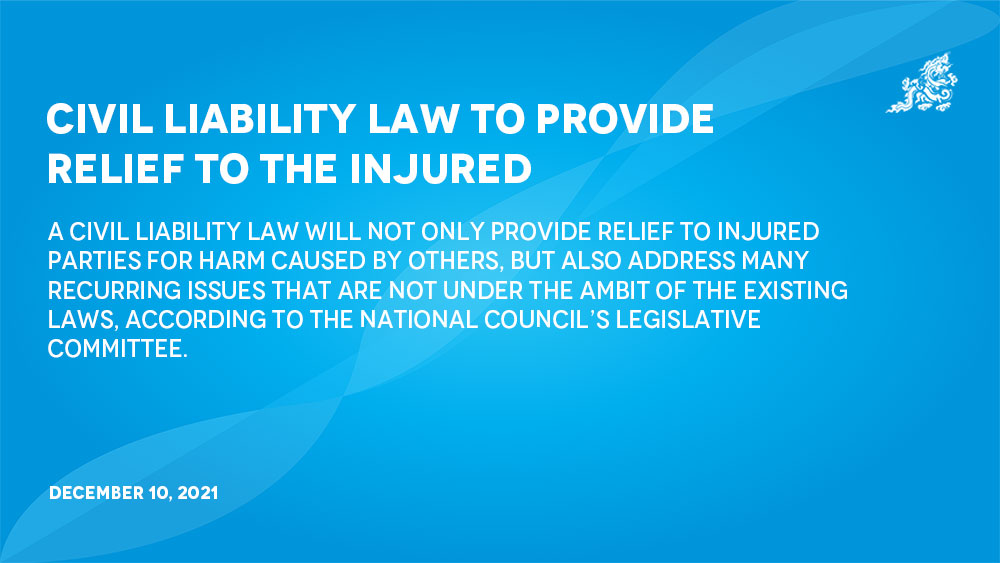MB Subba
A civil liability law will not only provide relief to injured parties for harm caused by others, but also address many recurring issues that are not under the ambit of the existing laws, according to the National Council’s Legislative Committee.
Presenting the review report on “The Drafting of the Civil Liability Bill” in the House yesterday, Legislative Committee Chairperson Phuntsho Rapten said that the drafting will require thorough research to avoid legislative redundancy and conflict of provisions.
One of the important issues that the Bill will cover is the harm caused by domestic animals to neighbours’ standing crops and farms. This situation has been identified as one of the main causes of recurring disputes in rural communities.
The Bill aims to make people more responsible with the care of their domestic animals and hold them accountable for crop and other damages caused by the animals.
Phuntsho Rapten said that the purpose is to provide monetary compensation or damages for harm or injury as a result of commission or omission by either organisations or individuals.
The committee also reported that there is a strong case for bringing the issue of harm caused by dogs into the ambit of the tort law. It stated that the law will complement the government’s efforts in combating the problem of stray dogs.
It is expected to instill and enhance the culture of accountability in the authorities and pet owners.
The committee reported that Bhutan had 102,000 dogs last year, 70 percent of which did not have owners. The country recorded a total of 6,430 dog bite incidents in 2020.
The report states that sexual harassment at workplaces and child abuse would find a special place in the Bill. “Child abuse is a serious problem that can have lasting and harmful effects on the mental and physical health of the child.”
The vice chairperson of the committee and eminent member, Ugyen Tshering, said that the intentional tort that the Bill will specifically provide for are the duties and liabilities of volunteers.
This means that volunteers owe a duty of care and they will be liable for any omission or breach of their duties. “But volunteers who perform their duties in good faith will be protected,” he said.
He said that providing liability protections to volunteers is expected to help ensure that they come forward to provide their services during emergencies and when needed.
Once the civil liability law is enacted, the committee reported that people who donate food, in particular during religious activities like tshechus and moenlam chenmos, may hesitate to do so out of fear they may be held responsible if the consumers fall ill.
“There is a need to provide protection and immunity to good faith food donors. However, intentional misconduct and gross negligence on the part of the food donors or good Samaritans will not be protected,” he said.
One of the committee members, Choining Dorji, said that professionals who fail to perform their responsibilities to the required standard or breach a duty of care will come under the ambit of the Bill.
He said that under the tort law, a claim of professional negligence can be made against anyone considered to have expertise in the services they provide.
The report states that many injuries and civil wrongs are caused by the negligence of road authorities. However, the committee reported that the Bill will not bring road authorities, except thromdes or dzongkhag municipalities, under its ambit.
The committee stated that the House needed to deliberate and identify an agency to take ownership of the Civil Liability Act after its enactment.
One of the major components of tort law will be the provision related to compensation.
The tort law, the committee stated, will rectify the loopholes that are prevalent in some of the current laws.
The Medical and Health Council Act and Food Act contain provisions imposing fines and penalties to the tortfeasors. But there are no provisions for payment of compensation.
Similarly, the Consumer Protection Act imposes liability to the offenders but the Act has no provisions for the computation and payment of compensation.
Members said that the success and effectiveness of the torts law will depend on how effectively the victims can enforce their rights.
The victims, the committee stated, will require legal aid for effective enforcement of rights. It stated that there is a need for a Legal Aid Act to complement the civil liability law.
The report also stated that the success and effectiveness of the torts law will depend on how effectively the victims can enforce their rights and seek relief from the courts.
Arguing for a Legal Aid Act, the members said that the tort law, being very technical and complex, will be difficult for the pro se victims to effectively litigate and seek compensation for the wrongs committed against them.
Some intentional torts can also be criminal, according to the report. For example, if A batters B and causes harm to the latter, that would also be a criminal act and the former can be arrested and sued at the same time.
A person involved in abnormally dangerous activities such as poisons, toxic chemicals, explosives, nuclear fuel and waste, and vicious animals is legally responsible for harmful consequences that are caused.
Product defects include defects in design, manufacturing defects, and warning defects. A person injured by a product defect may be able to recover based on strict liability, as well as for breach of warranty and negligence.
The committee chairperson said that a final draft will be tabled during the next session. A civil liability Act is also known as the law of tort.


